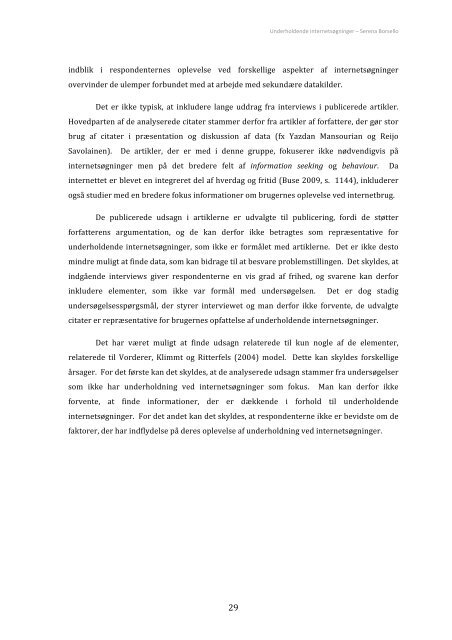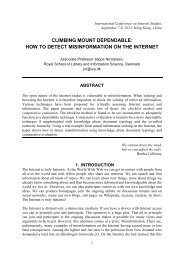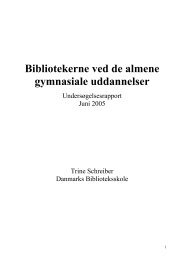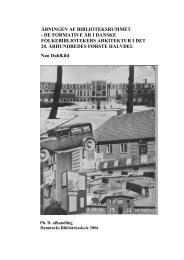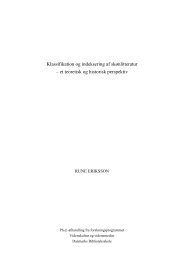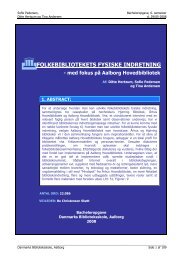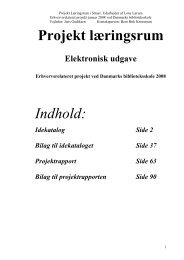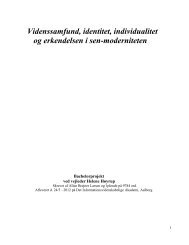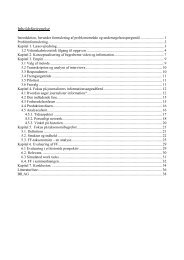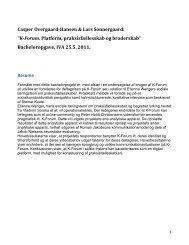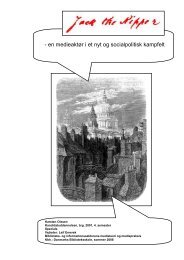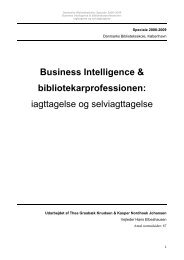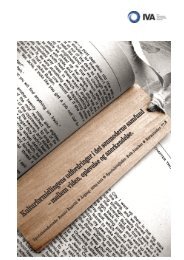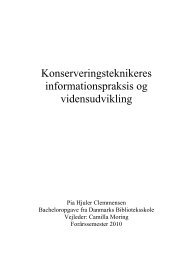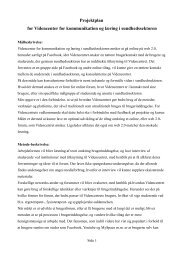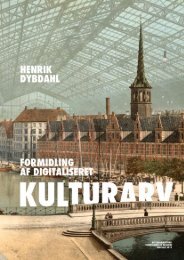Hvorfor er det sjovt at surfe på nettet? - Forskning
Hvorfor er det sjovt at surfe på nettet? - Forskning
Hvorfor er det sjovt at surfe på nettet? - Forskning
Create successful ePaper yourself
Turn your PDF publications into a flip-book with our unique Google optimized e-Paper software.
29<br />
Und<strong>er</strong>holdende int<strong>er</strong>netsøgning<strong>er</strong> – S<strong>er</strong>ena Borsello<br />
indblik i respondent<strong>er</strong>nes oplevelse ved forskellige aspekt<strong>er</strong> af int<strong>er</strong>netsøgning<strong>er</strong><br />
ov<strong>er</strong>vind<strong>er</strong> de ulemp<strong>er</strong> forbun<strong>det</strong> med <strong>at</strong> arbejde med sekundære d<strong>at</strong>akild<strong>er</strong>.<br />
Det <strong>er</strong> ikke typisk, <strong>at</strong> inklud<strong>er</strong>e lange uddrag fra int<strong>er</strong>views i public<strong>er</strong>ede artikl<strong>er</strong>.<br />
Hovedparten af de analys<strong>er</strong>ede cit<strong>at</strong><strong>er</strong> stamm<strong>er</strong> d<strong>er</strong>for fra artikl<strong>er</strong> af forf<strong>at</strong>t<strong>er</strong>e, d<strong>er</strong> gør stor<br />
brug af cit<strong>at</strong><strong>er</strong> i præsent<strong>at</strong>ion og diskussion af d<strong>at</strong>a (fx Yazdan Mansourian og Reijo<br />
Savolainen). De artikl<strong>er</strong>, d<strong>er</strong> <strong>er</strong> med i denne gruppe, fokus<strong>er</strong><strong>er</strong> ikke nødvendigvis <strong>på</strong><br />
int<strong>er</strong>netsøgning<strong>er</strong> men <strong>på</strong> <strong>det</strong> bred<strong>er</strong>e felt af inform<strong>at</strong>ion seeking og behaviour. Da<br />
int<strong>er</strong><strong>nettet</strong> <strong>er</strong> blevet en integr<strong>er</strong>et del af hv<strong>er</strong>dag og fritid (Buse 2009, s. 1144), inklud<strong>er</strong><strong>er</strong><br />
også studi<strong>er</strong> med en bred<strong>er</strong>e fokus inform<strong>at</strong>ion<strong>er</strong> om brug<strong>er</strong>nes oplevelse ved int<strong>er</strong>netbrug.<br />
De public<strong>er</strong>ede udsagn i artikl<strong>er</strong>ne <strong>er</strong> udvalgte til public<strong>er</strong>ing, fordi de støtt<strong>er</strong><br />
forf<strong>at</strong>t<strong>er</strong>ens argument<strong>at</strong>ion, og de kan d<strong>er</strong>for ikke betragtes som repræsent<strong>at</strong>ive for<br />
und<strong>er</strong>holdende int<strong>er</strong>netsøgning<strong>er</strong>, som ikke <strong>er</strong> formålet med artikl<strong>er</strong>ne. Det <strong>er</strong> ikke desto<br />
mindre muligt <strong>at</strong> finde d<strong>at</strong>a, som kan bidrage til <strong>at</strong> besvare problemstillingen. Det skyldes, <strong>at</strong><br />
indgående int<strong>er</strong>views giv<strong>er</strong> respondent<strong>er</strong>ne en vis grad af frihed, og svarene kan d<strong>er</strong>for<br />
inklud<strong>er</strong>e element<strong>er</strong>, som ikke var formål med und<strong>er</strong>søgelsen. Det <strong>er</strong> dog stadig<br />
und<strong>er</strong>søgelsesspørgsmål, d<strong>er</strong> styr<strong>er</strong> int<strong>er</strong>viewet og man d<strong>er</strong>for ikke forvente, de udvalgte<br />
cit<strong>at</strong><strong>er</strong> <strong>er</strong> repræsent<strong>at</strong>ive for brug<strong>er</strong>nes opf<strong>at</strong>telse af und<strong>er</strong>holdende int<strong>er</strong>netsøgning<strong>er</strong>.<br />
Det har været muligt <strong>at</strong> finde udsagn rel<strong>at</strong><strong>er</strong>ede til kun nogle af de element<strong>er</strong>,<br />
rel<strong>at</strong><strong>er</strong>ede til Vord<strong>er</strong><strong>er</strong>, Klimmt og Ritt<strong>er</strong>fels (2004) model. Dette kan skyldes forskellige<br />
årsag<strong>er</strong>. For <strong>det</strong> første kan <strong>det</strong> skyldes, <strong>at</strong> de analys<strong>er</strong>ede udsagn stamm<strong>er</strong> fra und<strong>er</strong>søgels<strong>er</strong><br />
som ikke har und<strong>er</strong>holdning ved int<strong>er</strong>netsøgning<strong>er</strong> som fokus. Man kan d<strong>er</strong>for ikke<br />
forvente, <strong>at</strong> finde inform<strong>at</strong>ion<strong>er</strong>, d<strong>er</strong> <strong>er</strong> dækkende i forhold til und<strong>er</strong>holdende<br />
int<strong>er</strong>netsøgning<strong>er</strong>. For <strong>det</strong> an<strong>det</strong> kan <strong>det</strong> skyldes, <strong>at</strong> respondent<strong>er</strong>ne ikke <strong>er</strong> bevidste om de<br />
faktor<strong>er</strong>, d<strong>er</strong> har indflydelse <strong>på</strong> d<strong>er</strong>es oplevelse af und<strong>er</strong>holdning ved int<strong>er</strong>netsøgning<strong>er</strong>.


